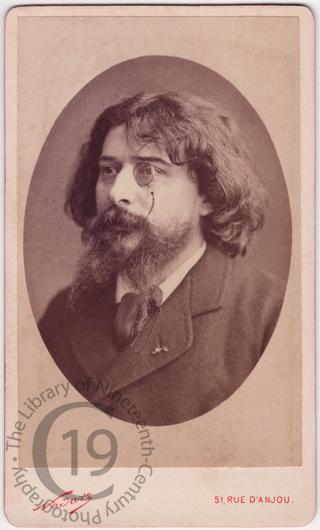
Alphonse Daudet
A carte-de-visite portrait of the French novelist Alphonse Daudet (1840-1897), now chiefly remembered as the author of sentimental tales of provincial life in the south of France.
Born the son of a silk manufacturer in 1840, Daudet wrote his first poems and his first novel when still only fourteen. In 1857 his parents lost all their money, and he had to give up his hopes of matriculating. Following an unhappy six months working as an usher at a school in Alès he joined his elder brother, Ernest, in Paris, where he threw himself into writing and began to frequent literary circles, both Bohemian and fashionable. A handsome young man, he formed a liaison with a model, Marie Rieu, to whom he dedicated his only book of poems, Les Amoureuses (1858). His long and troubled relationship with her was to be reflected much later in his novel Sapho (1884). He also contributed articles to the newspapers, in particular to Le Figaro. In 1860 he met Frédéric Mistral, the leader of the 19th-century revival of Provençal language and literature, who awakened his enthusiasm for the life of the south of France, which was regarded as inherently passionate, artistic, and sensuous as opposed to the moral and intellectual rigour of the north. In the same year, he obtained a secretarial post under the duke de Morny.
His health undermined by poverty and by the venereal disease that was eventually to cost him his life, Daudet spent the winter of 1861–62 in Algeria. One of the fruits of this visit was Chapatin le tueur de lions (1863). A winter in Corsica at the end of 1862 is recalled in passages of his Lettres de mon moulin (1869). In January 1867 he married Julia Allard, herself a writer of talent who gave him great help in his subsequent work. They had two sons, Léon and Lucien, and a daughter, Edmée.
During the Franco-German War Daudet enlisted in the army but he fled from Paris during the Commune of 1871. His novel Les Aventures prodigieuses de Tartarin de Tarascon (1872) though its adventurous hero is now celebrated as a caricature of naïveté and boastfulness. However, his next novel, Fromont jeune et Risler aîné (1874) won an award from the French Academy and was a success. For a few years Daudet enjoyed prosperity and fame.
In his last years Daudet suffered from an agonizing ailment of the spinal cord, a symptom of the advanced stages of his venereal disease. La Doulou (not published until 1931) represents his attempt to alleviate his pain by investigating it. With admirable self-control he continued to write books of all sorts and to entertain Parisian literary and musical society. In 1895 he visited London and Venice. He died in 1897.
Photographed by Nadar of Paris.
Code: 124346




